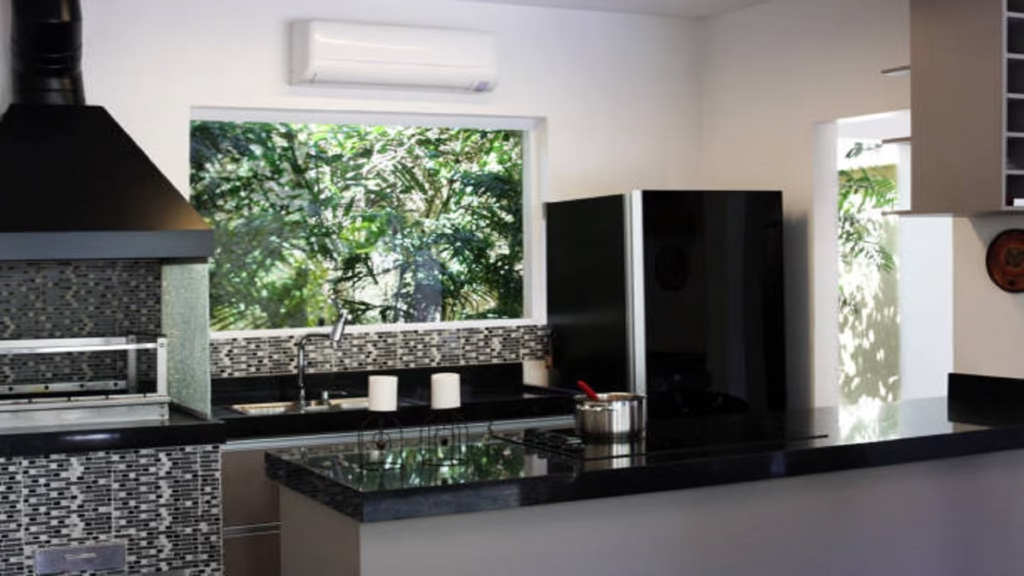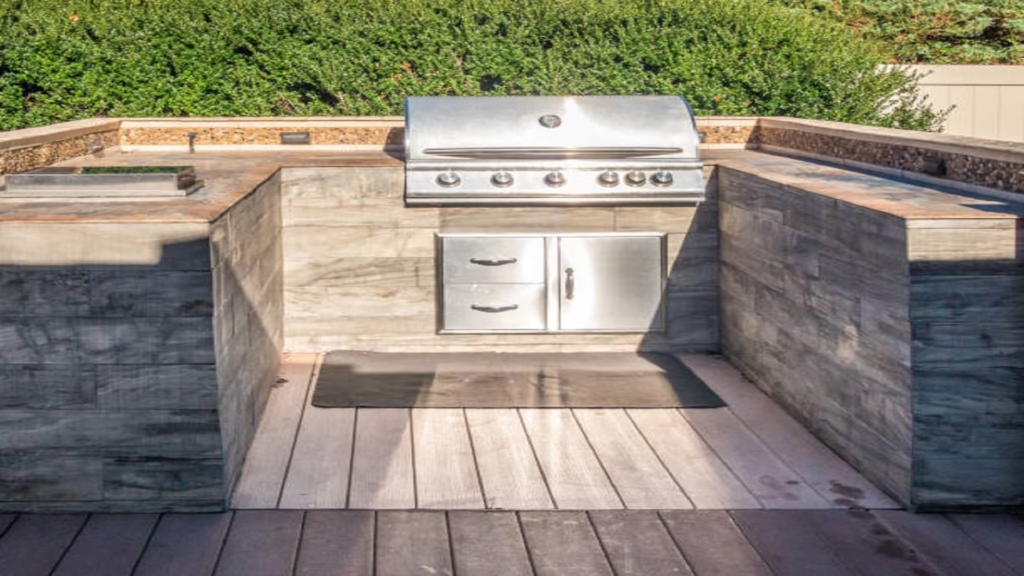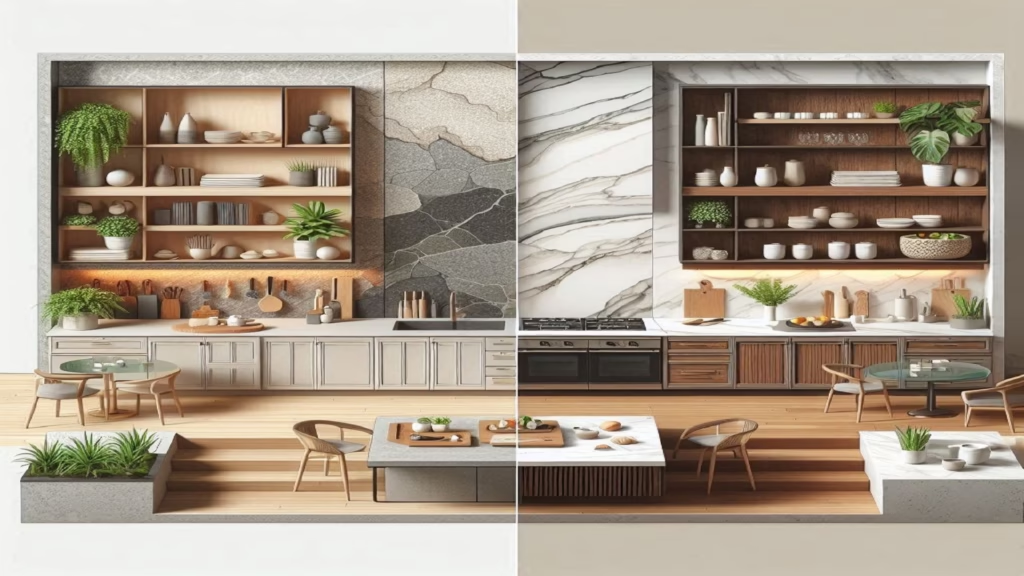Table Contents Outdoor Kitchen Countertops
- Introduction of Outdoor Kitchen Countertops
- Why Outdoor Countertops Matter
- Key Factors to Consider Before Choosing a Countertop
- Weather-Resistant Countertops: What Makes Them Essential?
- Durable Outdoor Surfaces for Long-Lasting Use
- Heatproof Kitchen Counters: A Must for Outdoor Cooking
- Best Materials for Outdoor Kitchen Countertops
- Natural Stone vs. Engineered Stone: Which One is Better?
- Concrete Countertops: A Stylish and Sturdy Option
- Stainless Steel Countertops: Modern and Functional
- Tile Countertops: Affordable and Customizable
- Wood Countertops: Rustic Beauty with Maintenance Needs
- Patio Cooking Countertops: How to Choose the Right One
- Backyard Kitchen Worktops: Making the Most of Your Space
- Stone Outdoor Counter Solutions: A Classic and Elegant Choice
- Outdoor Cooking Prep Stations: Designing for Efficiency
- UV-Resistant Kitchen Surfaces: Preventing Sun Damage
- Low-Maintenance Outdoor Counters: Best Choices for Easy Cleaning
- Alfresco Kitchen Counter Materials: What Works Best?
- Stain-Resistant Outdoor Counters: Keeping Your Space Clean
- Heavy-Duty Exterior Worktops: Built to Withstand the Elements
- DIY vs. Professional Installation: Which One to Choose?
- How to Maintain and Protect Your Outdoor Kitchen Countertops
- Budget-Friendly Outdoor Countertop Options
- Common Mistakes to Avoid When Choosing a Countertop
Introduction to Outdoor Kitchen Countertops
Outdoor Kitchen Countertops have become a popular addition to homes, offering a perfect blend of functionality and style. The right countertop can make or break your outdoor cooking experience, affecting everything from food preparation to aesthetics.
In this guide, we’ll explore the best outdoor kitchen countertops, discuss their features, pros and cons, and help you choose the perfect one for your space. Whether you’re looking for a low-maintenance option, a heatproof surface, or a stain-resistant countertop, this eBook has got you covered!

Why Outdoor Countertops Matter
Some people think an outdoor kitchen , Outdoor Kitchen Kits, is just about the grill, but the countertop is just as important. Here’s why:
- Food Preparation: A good countertop provides a spacious and safe surface to prepare meals.
- Durability: Unlike indoor countertops, outdoor ones must withstand sun, rain, wind, and extreme temperatures.
- Aesthetic Appeal: A well-chosen countertop enhances the beauty of your outdoor space.
- Functionality: A strong and heatproof surface makes cooking easier and safer.
If you don’t choose wisely, you might end up with a cracked, discolored, or warped countertop—and nobody wants that!
Key Factors to Consider Before Choosing a Countertop
Before diving into the different countertop materials, let’s look at some key factors to consider:
1. Weather Resistance
Since your countertop will be constantly exposed to the elements, it needs to handle rain, heat, UV rays, and temperature fluctuations without cracking or fading.
2. Durability
Outdoor kitchen countertops should be tough enough to handle heavy use, cutting, cooking, and spills.
3. Heat Resistance
Outdoor kitchens deal with grills, hot pots, and direct sunlight, so you need a surface that won’t get damaged by heat.
4. Maintenance Needs
Some materials require frequent sealing, cleaning, or refinishing, while others are low-maintenance.
5. Style and Design
Your countertop should match your outdoor kitchen design and enhance its look.
6. Budget
Prices vary widely—so it’s important to balance quality, durability, and cost.
Weather-Resistant Countertops – What Makes Them Essential?
The biggest challenge with outdoor kitchen countertops is weather exposure. Whether you live in a rainy region or a sunny desert, you need a countertop that can withstand it all.
Best Weather-Resistant Countertop Materials:
- ✅ Granite – Handles rain, heat, and UV exposure well.
- ✅ Concrete – Can be sealed to prevent water damage.
- ✅ Stainless Steel – Rust-resistant and highly durable.
- ✅ Porcelain – Non-porous and unaffected by moisture.
❌ Avoid: Laminate or untreated wood countertops – These will warp, crack, or discolor quickly.

Durable Outdoor Surfaces for Long-Lasting Use
Durability is key! The best outdoor kitchen countertops are those that last for years without damage.
Top Durable Countertops:
- Granite: Hard and scratch-resistant.
- Quartzite: Tougher than granite and withstands extreme weather.
- Stainless Steel: Industrial-grade durability.
- Concrete: Extremely strong but requires sealing.
If you love cooking outdoors and need a heavy-duty surface, these materials are your best bet!
Heatproof Kitchen Counters – A Must for Outdoor Cooking
Your outdoor countertop needs to withstand high temperatures, especially if placed near a grill or fire pit.
Best Heatproof Countertops:
- 🔥 Granite – Naturally heat-resistant.
- 🔥 Soapstone – Handles extreme temperatures well.
- 🔥 Concrete – Withstands direct heat when properly sealed.
- 🔥 Tile – Ceramic or porcelain tiles resist heat well.
Avoid plastic-based or synthetic materials as they melt, discolor, or warp under high heat.
Best Materials for Outdoor Kitchen Countertops
When it comes to choosing the right material for your outdoor kitchen, there are several options, each with its own benefits. Let’s take a closer look at the top countertop materials for outdoor kitchens:
1. Granite
Granite is a natural stone that’s perfect for outdoor kitchens. It’s extremely durable, weather-resistant, and heatproof. It also adds an elegant touch to your kitchen with its unique patterns and colors.
Pros:
- Extremely durable
- Heat and weather-resistant
- Elegant appearance
- Available in a variety of colors and patterns
It also adds an elegant touch to your kitchen with its unique patterns and colors.
Cons:
- Requires sealing to avoid staining
- Heavy, so may require professional installation
2. Concrete
Concrete countertops are a fantastic choice for outdoor kitchens due to their strength and versatility. They can be customized to any shape and size, and can even be colored or stamped to match your style.
It also adds an elegant touch to your kitchen with its unique patterns and colors.
Pros:
- Highly customizable
- Extremely durable
- Can handle extreme weather conditions
- Heavy, so may require professional installation
Cons:
- Requires sealing to prevent staining
- Can crack over time if not maintained properly
3. Quartz
Quartz countertops are engineered to offer the strength of natural stone with the added benefit of low maintenance. They’re stain-resistant and durable, making them a popular choice for outdoor kitchens.
It also adds an elegant touch to your kitchen with its unique patterns and colors.
Pros:
- Stain-resistant
- Non-porous, meaning no sealing required
- Heat-resistant
- Heavy, so may require professional installation
Cons:
- Can be prone to scratching
- Not as heat-resistant as granite or concrete
4. Stainless Steel
If you’re looking for a modern, sleek look, stainless steel countertops might be your best choice. They’re heatproof, rust-resistant, and perfect for a professional-style outdoor kitchen.
Pros:
- Modern look
- Heatproof and durable
- Easy to clean
Cons:
- Can scratch easily
- Shows fingerprints and watermarks
Natural Stone vs. Engineered Stone: Which One is Better?
Natural Stone
Natural stones like granite and soapstone are a classic choice for outdoor countertops. They are highly durable, but they require maintenance to keep them looking their best.
- Granite is naturally resistant to heat and weather conditions.
- Soapstone is incredibly durable and has a smooth, attractive finish that gets better with age.
Engineered Stone
On the other hand, engineered stones like quartz are man-made but offer the same durability and often require less maintenance. They’re designed to look like natural stone but resist stains and scratches better.
- Quartz is highly resistant to staining and is a non-porous material.
- Engineered stones are also more uniform in appearance, making them easier to match with other kitchen elements.
Which One is Better?
Both options have their advantages. If you’re after a unique, natural look and are willing to maintain it, natural stone is a great option. If you prefer something low-maintenance with a consistent appearance, engineered stone may be the better choice.

Concrete Countertops: A Stylish and Sturdy Option
Concrete countertops are gaining popularity in outdoor kitchens due to their strength and ability to withstand harsh weather. Concrete is also highly customizable. Allowing you to create a unique design that fits your space perfectly.
Benefits of Concrete Countertops:
- Highly durable and resistant to cracks when properly sealed
- Can be customized in terms of shape, color, and texture
- Heat-resistant and weatherproof
- Eco-friendly, as concrete can be made from recycled materials
However, concrete requires regular sealing to prevent staining, and it may develop small cracks over time, especially if subjected to extreme temperature changes.
Stainless Steel Countertops: Modern and Functional
If you’re aiming for a sleek, contemporary look, stainless steel is a fantastic choice for your outdoor kitchen. These countertops are often seen in professional kitchens due to their heat-resistance, durability, and clean appearance.
Why Choose Stainless Steel?
- Heatproof: Can withstand extreme temperatures.
- Rust-resistant: Perfect for outdoor environments.
- Easy to clean: Wipe down spills and messes with ease.
- Hygienic: The non-porous surface prevents bacteria from building up.
Scratches and watermarks can be more noticeable on stainless steel, so it’s important to consider whether this fits your aesthetic preference.
Choosing the Right Outdoor Kitchen Countertop for Your Space
The best outdoor kitchen countertop for your space depends on several factors, including your style, budget, and intended use. Here’s a guide to help you make the perfect choice:
1. Consider Your Climate
If you live in an area with extreme weather conditions, like high humidity, freezing temperatures, or excessive sun, you’ll want a material that can stand up to the elements. Materials like granite, concrete, and stainless steel are all weather-resistant, meaning they won’t warp or fade in the sun.
2. Budget-Friendly vs. Premium Options
If you’re on a budget, concrete and granite are relatively affordable options for durable outdoor countertops. On the other hand, quartz and stainless steel are generally more expensive but offer premium quality and long-lasting durability.
Scratches and watermarks can be more noticeable on stainless steel, so it’s important to consider whether this fits your aesthetic preference.
3. Intended Use
Do you plan to use your outdoor kitchen for just grilling, or will it be a full-service kitchen with cooking prep areas, sinks, and storage? If it’s a high-traffic area, you’ll want a heavy-duty countertop that can handle lots of use. Materials like granite, stone, and quartz are ideal for high-use spaces, as they resist scratches, stains, and heat.
If you’re on a budget, concrete and granite are relatively affordable options for durable outdoor countertops. On the other hand, quartz and stainless steel are generally more expensive but offer premium quality and long-lasting durability.

Preparing Your Outdoor Space for Countertop Installation
Installing a countertop in your outdoor kitchen is not just about selecting the right material – it’s also about preparing the space correctly for the installation process. Follow these steps to ensure a smooth and successful countertop installation:
1. Measure Your Space
Before you even choose a countertop material, make sure to accurately measure the area where the countertop will go. This will give you an idea of the amount of material you’ll need and help you avoid any costly mistakes.
2. Assess the Structural Integrity
Installing a countertop in your outdoor kitchen is not just about selecting the right material – it’s also about preparing the space correctly for the installation process. Before you even choose a countertop material, make sure to accurately measure the area where the countertop will go. Ensure that the base of your outdoor kitchen is level and sturdy. Some materials like granite and quartz can be quite heavy, so you’ll need to make sure your base can support the weight.
3. Prepare the Foundation
If your countertop material is stone or concrete, the foundation should be built to handle the weight and moisture levels. Consider adding a moisture barrier if you’re in a high-humidity area.
4. Professional Installation
While DIY may be tempting, professional installation is often best, especially for stone countertops that require precise cutting and heavy lifting. It also ensures the correct placement and seamless fit.
Maintenance Tips for Outdoor Kitchen Countertops
Proper maintenance will keep your outdoor kitchen countertops looking their best for years to come. Here are some easy-to-follow tips to help you care for your countertops:
1. Clean Regularly
Keep your countertops clean by wiping down spills immediately. For stone or granite, use a soft cloth with a mild soap solution. Avoid harsh chemicals that can damage the surface.
2. Sealing (If Required)
Some materials, such as granite, require sealing to prevent stains from liquids like wine or oil. Be sure to reseal your countertops at least once a year, or as needed.
3. Avoid Harsh Scratching Materials
While many outdoor countertops are heatproof and durable, it’s still a good idea to avoid using sharp objects directly on the surface. Always use a cutting board to protect your counters from scratches.
4. Protect from Weather Damage
For extreme weather conditions, use covers for your outdoor kitchen countertops during winter or during periods of extreme sun exposure. This will help protect the material from cracking or fading.
The Cost of Outdoor Kitchen Countertops
The cost of installing a countertop in your outdoor kitchen depends on the material, installation fees, and the size of your space. Here’s a quick breakdown of the cost ranges for different materials:
1. Granite
Granite countertops range from $50 to $200 per square foot, depending on the quality and the installation complexity. While granite is on the higher-end, it’s worth the investment for its durability and elegance.
2. Concrete
Concrete is typically more affordable, with costs ranging from $50 to $100 per square foot. However, custom designs or intricate finishing can push the price up.
3. Quartz
Custom designs or intricate finishing can push the price up.Quartz countertops are priced between $60 and $150 per square foot. Although a bit pricier than concrete, quartz offers low maintenance and high durability.
4. Stainless Steel
Stainless steel is generally the most expensive option, with costs ranging from $75 to $200 per square foot. The final price will vary depending on the thickness of the material and the design.
While granite is on the higher-end, it’s worth the investment for its durability and elegance.

Common Mistakes to Avoid When Choosing Outdoor Kitchen Countertops
When selecting and installing outdoor kitchen countertops, there are some common mistakes you’ll want to avoid:
1. Not Considering the Climate
If you live in a humid or freezing area, be sure to select a countertop that can withstand these conditions. Stone or concrete may not perform well in extreme cold unless properly sealed.
2. Overlooking Maintenance
Different materials require different levels of care. While quartz and stainless steel are relatively low-maintenance, others like granite and concrete need to be sealed and maintained regularly.
3. Choosing the Wrong Size or Shape
Make sure your countertop fits the design of your kitchen. Large granite slabs may be hard to install if your kitchen is too small.
4. Focusing Too Much on Appearance
While aesthetics are important, don’t sacrifice durability and functionality for style. Choose a material that suits your needs, not just your tastes.
While granite is on the higher-end, it’s worth the investment for its durability and elegance.
The Best Outdoor Kitchen Countertop Materials for Different Needs
Not all outdoor kitchens are the same, and the countertop material you choose should suit your cooking habits and lifestyle. Here’s a breakdown of the best countertop materials based on different needs:
1. For Grilling Enthusiasts
If you love grilling, you need a heat-resistant countertop that can handle high temperatures from hot pans or grilling equipment. Stainless steel and granite are great choices. They’re both heatproof and durable, meaning they won’t suffer from the high heat generated by grills.
2. For Low-Maintenance Lovers
If you’re not a fan of constant cleaning or upkeep, then you’ll want a low-maintenance countertop. Quartz is a fantastic option because it doesn’t require sealing and is highly resistant to stains. It’s also non-porous, which makes it easier to clean and maintain over time.
3. For Stylish Outdoor Kitchens
If style is a top priority for you, materials like granite and concrete can give your kitchen an elegant, sophisticated look. Both materials come in a variety of colors and finishes, allowing you to customize the appearance to match your outdoor space.
4. For Heavy-Use Kitchens
If your kitchen is going to see a lot of action – whether you’re cooking for a crowd or hosting parties – you’ll want a heavy-duty countertop that can handle the wear and tear. Concrete and stone are ideal for this purpose, as they are tough and resistant to scratches, stains, and heat.
Outdoor Kitchen Countertop Trends
Like indoor kitchens, outdoor kitchens are also evolving, and countertop trends are no exception. Here are some emerging trends in outdoor kitchen countertops to look out for:
1. Sustainable Materials
Sustainability is a growing trend, with more people opting for eco-friendly materials like recycled glass and sustainable wood. These options reduce environmental impact while still offering the style and functionality you need.
2. Bold Colors and Patterns
Gone are the days when outdoor kitchen countertops were all about neutral tones. Today, more people are choosing countertops in bold colors and patterns to add flair to their kitchens. From vibrant blues to marble-like textures, the possibilities are endless.
3. Integrated Lighting
More outdoor kitchens are incorporating integrated lighting within the countertops, either beneath the countertop or along the edges. This creates a visually stunning effect, perfect for evening cooking and dining.
4. Mixed Materials
Another trend gaining traction is the use of mixed materials. For example, a countertop might feature a stone surface with stainless steel or wood accents. This mix of materials adds texture and visual interest to your outdoor kitchen.
These options reduce environmental impact while still offering the style and functionality you need.

Designing Your Outdoor Kitchen Around Your Countertop
Once you’ve chosen your outdoor countertop, the next step is designing your kitchen around it. The countertop will be one of the main focal points, so consider how it interacts with other elements in the kitchen:
1. Kitchen Layout
Your layout will depend on the size and shape of your countertop. L-shaped or U-shaped kitchens work well with large countertops, while a linear design may suit smaller spaces better. Make sure the countertop is accessible and allows for easy cooking and preparation.
2. Choosing Complementary Materials
Consider the rest of your kitchen materials – cabinets, backsplashes, flooring, and lighting – and choose complementary finishes that work well with your countertop. For example, a light-colored granite countertop might pair nicely with dark wood cabinets or a modern concrete backsplash.
3. Functionality
While design is essential, don’t forget about the functionality of your outdoor kitchen. You want your countertop to provide plenty of work space for food preparation, and you may also want to include extra features like an outdoor sink or barbecue station. Make sure the countertop is spacious and can accommodate all your needs.
A light-colored granite countertop might pair nicely with dark wood cabinets or a modern concrete backsplash.
Author Remarks
As more people embrace outdoor living and alfresco cooking, the demand for high-quality outdoor kitchen countertops will continue to rise. Thanks to advancements in materials and technology, you now have more choices than ever before when selecting your countertop. Whether you opt for stone, concrete, stainless steel, or quartz, you can be sure that there’s a material out there that will suit your style, budget, and needs.
So, go ahead and transform your backyard kitchen into a gourmet space that’s as beautiful as it is functional. With the right countertop, your outdoor kitchen will be ready to handle everything from casual family dinners to hosted parties, all while standing up to the elements.


1 Comment